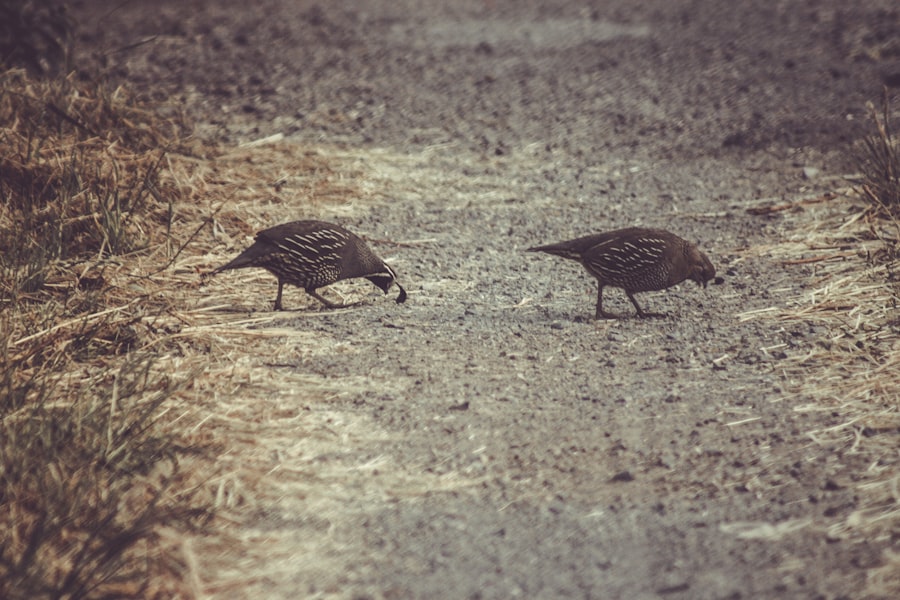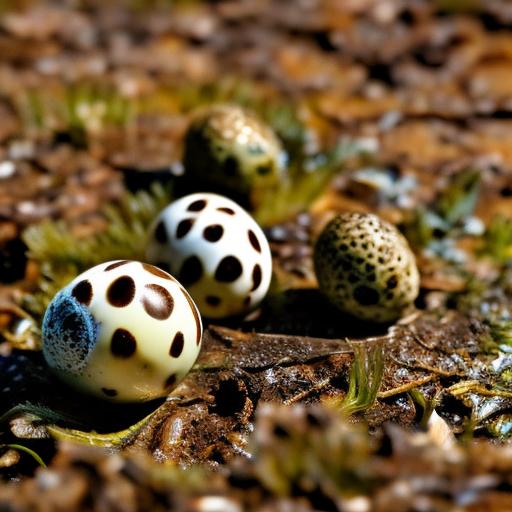Quail eggs are small, speckled eggs that come from the quail bird, a small game bird that is native to Europe, Asia, and Africa. These eggs are gaining popularity in the culinary world due to their delicate flavor and high nutritional value. Quail eggs are packed with essential nutrients such as protein, vitamins, and minerals, making them a healthy addition to any diet. They are also known for their beautiful appearance, with a unique speckled pattern on the shell that adds an elegant touch to any dish. Quail eggs can be enjoyed in a variety of ways, from being boiled and served as a snack to being used in baking and cooking. Due to their small size, quail eggs are often used as a garnish or decorative element in dishes, adding a touch of sophistication to any meal.
Quail eggs are also known for their potential health benefits. They are rich in protein, which is essential for muscle growth and repair. They also contain important vitamins and minerals such as vitamin B12, which is crucial for maintaining healthy nerve and blood cells, and selenium, which acts as an antioxidant in the body. Additionally, quail eggs are lower in cholesterol compared to chicken eggs, making them a healthier option for those watching their cholesterol intake. With their unique flavor and impressive nutritional profile, quail eggs are a versatile and valuable addition to any kitchen.
Key Takeaways
- Quail eggs are small, nutritious eggs that are gaining popularity for their unique flavor and health benefits.
- Storing quail eggs in the fridge at a consistent temperature of 45-50°F can help extend their shelf life.
- Factors affecting the shelf life of quail eggs include temperature, humidity, and handling during collection and storage.
- Signs of spoilage in quail eggs include changes in color, texture, and odor, as well as the presence of mold or bacteria.
- Tips for extending the shelf life of quail eggs include washing them before storage, storing them with the pointed end down, and consuming them within 2-3 weeks of purchase.
Storing Quail Eggs in the Fridge
Storing quail eggs properly is essential for maintaining their freshness and quality. When it comes to storing quail eggs in the fridge, there are a few key factors to keep in mind. First and foremost, it’s important to store quail eggs in the refrigerator as soon as possible after purchasing them. This helps to slow down the growth of bacteria and prolongs the shelf life of the eggs. Quail eggs should be stored in their original carton or in an egg holder to prevent them from rolling around and potentially cracking. It’s best to store quail eggs in the coldest part of the refrigerator, such as the back of the bottom shelf, where the temperature is most consistent.
It’s also important to keep quail eggs away from strong-smelling foods such as onions and garlic, as they can absorb these odors easily. Additionally, quail eggs should be kept away from foods with strong flavors, as they can also absorb these flavors through their porous shells. When storing quail eggs in the fridge, it’s best to keep them in their original packaging until they are ready to be used. This helps to protect the eggs from absorbing any unwanted odors or flavors from the surrounding environment. By following these storage guidelines, quail eggs can be kept fresh and safe for consumption for an extended period of time.
Factors Affecting the Shelf Life of Quail Eggs
Several factors can affect the shelf life of quail eggs, including temperature, humidity, and handling. The temperature at which quail eggs are stored plays a significant role in determining their shelf life. Quail eggs should be stored at a consistent temperature of around 45°F (7°C) in order to maintain their freshness. Fluctuations in temperature can cause condensation to form on the eggshells, which can lead to bacterial growth and spoilage. Additionally, exposure to high temperatures can cause the eggs to spoil more quickly. Humidity is another important factor that can affect the shelf life of quail eggs. Excessive moisture can cause the eggs to spoil, while low humidity can cause the eggs to dry out and lose quality.
Proper handling is also crucial for preserving the shelf life of quail eggs. Rough handling can cause the eggs to crack or break, which can lead to contamination and spoilage. It’s important to handle quail eggs with care and avoid dropping or jostling them. Additionally, washing quail eggs before storing them can remove the protective coating on the shell, making them more susceptible to bacteria and spoilage. By taking these factors into consideration and implementing proper storage practices, the shelf life of quail eggs can be extended, allowing for longer enjoyment of their unique flavor and nutritional benefits.
Signs of Spoilage in Quail Eggs
It’s important to be able to recognize the signs of spoilage in quail eggs in order to ensure their safety for consumption. One of the most common signs of spoilage in quail eggs is a change in odor. Fresh quail eggs should have a neutral or slightly earthy smell. If the eggs emit a strong or unpleasant odor, it is likely that they have spoiled and should not be consumed. Another indicator of spoilage is changes in appearance. Fresh quail eggs have clean, unblemished shells with no cracks or discoloration. If the shells appear dirty, cracked, or discolored, it is best to discard the eggs.
When cracked open, fresh quail eggs should have clear, firm whites and round yolks that stand tall. If the whites appear watery or discolored, or if the yolks appear flat or runny, it is a sign that the eggs have spoiled. Additionally, if there is any mold present on the eggshell or inside the egg, it is best to discard it immediately. Lastly, if there are any unusual textures or sliminess present when handling the eggs, it is a clear indication that they have spoiled and should not be consumed. By being aware of these signs of spoilage, consumers can ensure that they are consuming safe and high-quality quail eggs.
Tips for Extending the Shelf Life of Quail Eggs
There are several tips and tricks that can help extend the shelf life of quail eggs and keep them fresh for longer periods of time. One effective method for prolonging the shelf life of quail eggs is by applying a thin layer of mineral oil to the eggshells. This helps to seal the pores on the shell and prevent air and bacteria from entering the egg, thus slowing down spoilage. Another method is to store quail eggs with the pointed end facing downwards. This helps to keep the air cell at the larger end of the egg centered, which can help prevent spoilage.
It’s also important to regularly check for any cracked or damaged eggs and remove them from the carton immediately. Cracked eggs are more susceptible to bacterial contamination and can cause other eggs to spoil more quickly. Additionally, it’s best to store quail eggs in their original carton rather than transferring them to an egg holder or tray. The original carton helps protect the eggs from absorbing unwanted odors and flavors from other foods in the refrigerator. By implementing these tips for extending the shelf life of quail eggs, consumers can enjoy fresh and high-quality eggs for longer periods of time.
Using Quail Eggs After the Expiration Date

While it’s important to be mindful of expiration dates when consuming food products, quail eggs can often be used safely after their expiration date has passed. As long as quail eggs have been stored properly in the refrigerator and show no signs of spoilage, they can typically be consumed past their expiration date. It’s important to carefully inspect each egg for any signs of spoilage before using them in cooking or baking. If there are any doubts about the freshness of the eggs, it’s best to err on the side of caution and discard them.
Quail eggs that have passed their expiration date can still be used in a variety of dishes such as omelets, salads, and baked goods. Cooking quail eggs thoroughly can help kill any potential bacteria and ensure their safety for consumption. By using quail eggs after their expiration date with careful inspection and proper cooking techniques, consumers can minimize food waste and continue to enjoy the unique flavor and nutritional benefits of these small but mighty eggs.
Conclusion and Final Thoughts
In conclusion, quail eggs are a versatile and nutritious food that can be enjoyed in a variety of culinary applications. Proper storage practices are essential for maintaining the freshness and quality of quail eggs. Factors such as temperature, humidity, and handling can all affect the shelf life of quail eggs, so it’s important to store them carefully in the refrigerator and handle them with care. By being aware of the signs of spoilage and implementing tips for extending shelf life, consumers can ensure that they are consuming safe and high-quality quail eggs.
While it’s important to be mindful of expiration dates when consuming food products, quail eggs can often be used safely after their expiration date has passed as long as they show no signs of spoilage. By carefully inspecting each egg before use and cooking them thoroughly, consumers can continue to enjoy quail eggs past their expiration date with confidence. With their delicate flavor and impressive nutritional profile, quail eggs are a valuable addition to any kitchen and can be enjoyed with peace of mind when stored and handled properly.
Quail eggs are a delightful addition to any kitchen, but how long do they keep in the fridge? If you’re curious about the shelf life of quail eggs, you might also be interested in learning about the natural hatching process of chicken eggs. Understanding the timeline and conditions required for chicken eggs to hatch naturally can provide valuable insights into the care and handling of quail eggs. For more information on this topic, check out this informative article on how long for chicken eggs to hatch naturally.
FAQs
What is the shelf life of quail eggs in the fridge?
Quail eggs can typically be stored in the refrigerator for up to 2-3 weeks.
How should quail eggs be stored in the fridge?
Quail eggs should be stored in their original carton in the refrigerator, preferably in the coldest part of the fridge.
How can I tell if quail eggs have gone bad?
You can tell if quail eggs have gone bad by performing a float test. Place the eggs in a bowl of water – if they sink to the bottom and lay flat, they are fresh. If they stand upright or float, they are no longer fresh and should be discarded.
Can quail eggs be frozen for longer storage?
Yes, quail eggs can be frozen for longer storage. However, it is recommended to crack the eggs and remove them from their shells before freezing. They can be stored in an airtight container or freezer bag for up to 2-3 months.
Meet Walter, the feathered-friend fanatic of Florida! Nestled in the sunshine state, Walter struts through life with his feathered companions, clucking his way to happiness. With a coop that’s fancier than a five-star hotel, he’s the Don Juan of the chicken world. When he’s not teaching his hens to do the cha-cha, you’ll find him in a heated debate with his prized rooster, Sir Clucks-a-Lot. Walter’s poultry passion is no yolk; he’s the sunny-side-up guy you never knew you needed in your flock of friends!







